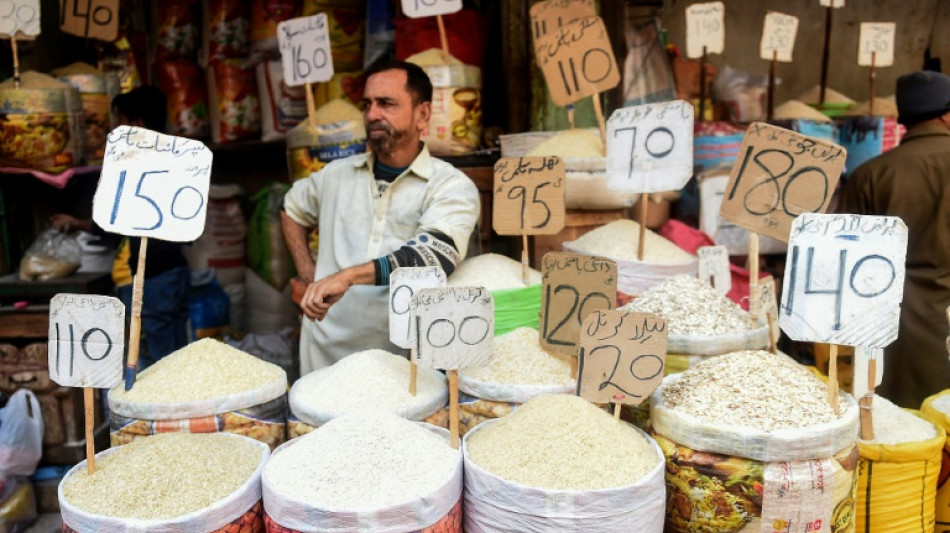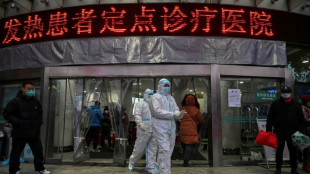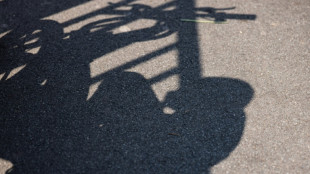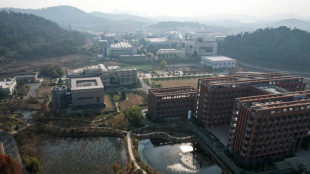
-
 Indonesia's Mount Ibu erupts more than 1,000 times this month
Indonesia's Mount Ibu erupts more than 1,000 times this month
-
Sumo to stage event in Paris as part of global push

-
 Deadly strikes on Gaza after Israel says ceasefire delayed
Deadly strikes on Gaza after Israel says ceasefire delayed
-
Badosa 'loves Coco' but is gunning for 'revenge' in Melbourne quarters

-
 Sabalenka, Gauff on Melbourne collision course as Alcaraz moves on
Sabalenka, Gauff on Melbourne collision course as Alcaraz moves on
-
Alcaraz into Australian Open quarters after Draper retires

-
 Sabalenka uses fighting spirit to banish Australian Open blues
Sabalenka uses fighting spirit to banish Australian Open blues
-
Sabalenka, Gauff on Melbourne collision course after reaching quarters

-
 Swiss rider Ruegg wins opening UCI World Tour event in Australia
Swiss rider Ruegg wins opening UCI World Tour event in Australia
-
Mitchell scores 36 as Cavs bounce back, Celtics downed

-
 Sabalenka a happy snapper at Australian Open
Sabalenka a happy snapper at Australian Open
-
Gauff turns up heat on Bencic to reach Australian Open quarters

-
 Commanders stun Lions in NFL thriller, Chiefs advance
Commanders stun Lions in NFL thriller, Chiefs advance
-
Protesters storm S. Korea court after president's detention extended

-
 TikTok notifies US users of shutdown as Trump seeks last-ditch solution
TikTok notifies US users of shutdown as Trump seeks last-ditch solution
-
Ceasefire in Israel-Hamas war to begin at 0630 GMT

-
 Wuhan keen to shake off pandemic label five years on
Wuhan keen to shake off pandemic label five years on
-
Sabalenka imperious as Djokovic, Alcaraz on Melbourne collision course

-
 'Generational problem': Youth still struggling in pandemic's shadow
'Generational problem': Youth still struggling in pandemic's shadow
-
Vaccine misinformation: a lasting side effect from Covid

-
 Sabalenka blows away Andreeva to reach Melbourne quarter-finals
Sabalenka blows away Andreeva to reach Melbourne quarter-finals
-
Hope, fear at Paris rally for Gaza hostages

-
 Separated by LA wildfires, a happy reunion for some pets, owners
Separated by LA wildfires, a happy reunion for some pets, owners
-
France's Moutet 'collapsed in shower' before Australian Open match

-
 In US, teleworkers don't want to turn back
In US, teleworkers don't want to turn back
-
Covid's origins reviewed: Lab leak or natural spillover?

-
 Trump arrives in Washington ahead of Monday's inauguration
Trump arrives in Washington ahead of Monday's inauguration
-
Steady Straka takes four-shot lead in PGA Tour's American Express

-
 Kelce, Mahomes double-act leads Chiefs past Texans in NFL playoffs
Kelce, Mahomes double-act leads Chiefs past Texans in NFL playoffs
-
Barcelona's Balde complains of racist abuse in Getafe draw

-
 Frustrated Barca fail to capitalise on Atletico La Liga slip
Frustrated Barca fail to capitalise on Atletico La Liga slip
-
More Kenyan police land in Haiti to bolster security mission

-
 McGlynn leads youthful USA to friendly win over Venezuela
McGlynn leads youthful USA to friendly win over Venezuela
-
Barcelona stumble to frustrating Getafe draw in title setback

-
 Lukaku fires Napoli six points clear at Atalanta, Juve sink Milan
Lukaku fires Napoli six points clear at Atalanta, Juve sink Milan
-
Milder winds help LA firefighters as Trump vows to visit

-
 S. Korean court extends impeached president's detention, angering supporters
S. Korean court extends impeached president's detention, angering supporters
-
Wirtz has Leverkusen on Bayern's heels to keep repeat title 'dream' alive

-
 Arsenal must take blame for Villa fightback: Arteta
Arsenal must take blame for Villa fightback: Arteta
-
Nunez late show extends Liverpool's lead, Arsenal held by Aston Villa

-
 Russian attacks kill six across Ukraine, Kyiv says
Russian attacks kill six across Ukraine, Kyiv says
-
Northampton, Leinster claim Champions Cup pool top spots

-
 Arsenal's title bid rocked by Villa fightback
Arsenal's title bid rocked by Villa fightback
-
Superb Wirtz keeps Leverkusen on pace with leaders Bayern

-
 Detention extended for S. Korea's impeached president
Detention extended for S. Korea's impeached president
-
Thousands attend funeral of Liberian ex-warlord Prince Johnson

-
 Barcola strikes as PSG fight back to beat Lens
Barcola strikes as PSG fight back to beat Lens
-
Juventus into Serie A Champions League spots with victory over AC Milan

-
 Kane calls on Bayern to extend with pal Dier
Kane calls on Bayern to extend with pal Dier
-
Kenya sends 217 more police officers to Haiti mission


Pakistan's economic woes put PM Khan's future in doubt
Housewife Maira Tayyab has considered begging for money to feed her family in inflation-hit Pakistan, while shop owner Mohammad Hanif finds his thoughts turning to crime.
They're too proud and honest to act on the impulse, but their woes are shared by millions of Pakistanis whose disgruntlement threatens Prime Minister Imran Khan's chances of re-election next year.
"We cannot beg as we are white-collar people," Tayyab, 40, told AFP in Karachi, a bustling port city that is Pakistan's financial capital.
But, she said: "We don't know how we make ends meet."
Inflation hit about 10 percent last year, according to the World Bank. The cooking oil price is up 130 percent since Khan took power and the cost of fuel has risen 45 percent to 145 rupees ($0.82) a litre in a year.
Tayyab's sentiments are echoed by Kursheed Sharif, a 50-year-old mother of five, who unleashes a slew of curses as she describes her family's woes.
"Only death seems an alternative to survival under this government," she told AFP, close to tears, outside her unplastered rental shack.
Khan promised to sweep away decades of entrenched corruption and cronyism when his Pakistan Tehreek-e-Insaf (PTI) party swept to power in 2018.
But his failure to deliver is already being felt at the polls, and last month the PTI was soundly thrashed in provincial elections in its Khyber Pakhtunkhwa stronghold.
"The government boasts about its economic feats, but in reality it has lost its ground and credibility," said Tauseef Ahmed Khan, a rights activist and political commentator.
- Inherited a mess -
Khan had campaigned on a platform of creating an Islamic welfare state, with efficient taxation on businesses and individuals funding social projects to benefit the poor.
Analysts admit he inherited a mess -- and the Covid-19 pandemic has not helped -- but his policies have done little to change the state of affairs.
"Nothing is stable," said Rashid Alam, who works for an international bank in Karachi.
"Increased unemployment, increased inflation... this is the political and economic reality in Pakistan."
The numbers bear him out.
Although the economy is forecast to grow four percent in 2022, for the past three years it has remained largely stagnant.
The rupee has also taken a pounding, losing 12 percent to the dollar since July -- not helped by a $5 billion trade deficit, and despite forex remittances from a vast diaspora growing nearly 10 percent to $12.9 billion.
Khan argued this week that Pakistan's problems -- specifically inflation -- were not unique, saying it remains "one of the cheapest countries" in the world.
There are some pluses.
The manufacturing and service sectors are rebounding as lockdowns ease, the World Bank has said, and better rains this year will boost agriculture.
But the biggest problem facing the economy is servicing nearly $127 billion in debt.
Khan successfully negotiated a $6 billion International Monetary Fund (IMF) loan package in 2019, but only a third was paid before the tap turned off after the government failed to implement promised reforms -- including slashing subsidies on a range of essentials.
Pakistan has had to accept painful conditions, such as increasing petrol and electricity prices.
Ahead of an IMF meeting later this month to decide whether to release another tranche, the government has pushed through a mini-budget -- with new or increased taxes on a range of imports, exports and services -- that has drawn the ire of millions.
"Can you imagine oil and sugar prices reaching this level?" housewife Sharif lamented.
- Criminal thoughts -
On the brink of defaulting, Islamabad has recently tapped $3 billion each from China and Saudi Arabia, and $2 billion from the United Arab Emirates.
"All the loans it has been taking now, from whatever sources, are to pay past loans," said Qaiser Bengali, an independent economist.
"Essentially the economy is bankrupt. Pakistan cannot pay its loans."
Still, nobody seems prepared to pay for services they want.
Tax evasion is almost a national sport -- fewer than two million people paid in 2020, from a working population 25 times that -- and receipts account for less than 10 percent of gross domestic product, the lowest in the region.
That sort of chicanery prompts Muhammad Hanif, who runs a small car-battery repair shop, to think of new ways to support his family.
"(Criminal) thoughts occupy me as to how I must meet ends," he said.
"But I fear Allah, so I shrug off those thoughts."
M.King--AT
